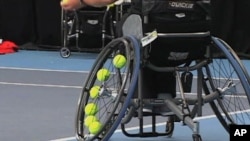The London-hosted Paralympic games for disabled athletes are two years away and Great Britain has begun to search for talent and bring its athletes together at a new training center in the Southwestern city of Bath.
Louise Hunt has been in a wheelchair since birth, and at 19 has been playing tennis half her life. Her big dream is to make Great Britain's Paralympic team. "I'm hoping to qualify with a cleaned ranking, so that means I'm in the top 24 in the world," she said.
She is currently ranked 19th - and feels confident she will make the team.
Out on the archery range they are aiming for the same thing. Here the athletes are aged from 16 to 60 and include one with scoliosis, another with spina bifida and an amputee.
"Archery is a sport for all disabilities. It is not just a sport where if you can't do anything else you come to archery, this is, you have to be an athlete to do this," said Tim Hazell, archery team coach.
This training camp in Southwestern England has brought together 160 athletes across 15 sports. Some events like Boccia are unique to the Paralympics - it does not have an Olympic equivalent, and can be played by the most severely disabled. Others are more traditional, but with two years to go until the London games the focus is clear.
"Everything that we do from now on is really vital for our performance and what will happen in 2012," said wheelchair basketball player Fran Ray.
Coaches hope to spot new talent here and get a sense of what their Paralympic teams might look like, but that is not all this camp is about.
By bringing all the sports together in one place, organizers are trying to foster a Paralympic community and build the kind of atmosphere these athletes might find at the real games, in 2012.
There are more Paralympic athletes competing than ever before both here in Britain and around the world. Paralympian champion and head of Britain's organizing team Chris Holmes says there has been a big shift. "Paralympic sport is almost reflecting global economics at the moment, ao you've got fantastic Paralympic competitors, big teams from Brazil, Russia, China," Holmes said.
Britain's sitting-down volleyball team is one that has seen new athletes come from the military. Veterans injured in Iraq and Afghanistan are a welcome addition says team captain Robert Richardson. "They're competitive, they're fit, and they know what it takes to be an elite athlete," he said.
For the first time ever, there is big interest in the international TV rights for the Paralympic Games. If they are sold worldwide, as many as four-billion people may watch these athletes perform in 2012.




